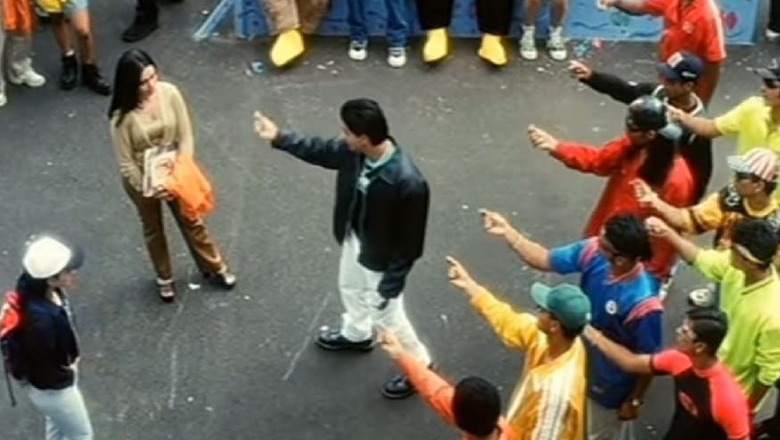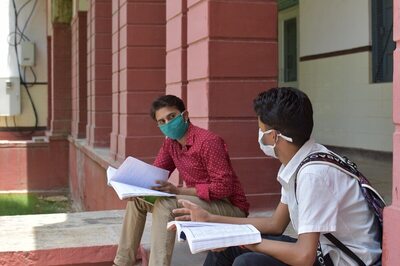
views
In Mohit Suri's 2017 film Half Girlfriend, Arjun Kapoor's character Madhav tries to force himself on Shraddha Kapoor's character Riya when she is in his hostel room. When Riya rushes out of the room because she is not into Madhav, the entire men's hostel slut-shames her. Two hours and a few Arijit Singh sob songs later, the boy gets said girl and they live happily ever after.
When Rahul Khanna, with his gang of "cool boys" surround Tina Malhotra and taunt her for not being 'sanskaari enough' in Kuch Kuch Hota Hai, we forget that our lover boi Shah Rukh Khan is literally slut-shaming and hazing a new girl on the basis of her clothes and the country she's come from.
The plotlines of Main Tera Hero, Judwa 2, Kabir Singh, the first hour of Dilwaale Dulhaniya Le Jaayenge and hundreds of movies every year thrive on the fact that the hero can literally pull any stunt to objectify, harass and abuse their "love interest" and then end up with the girl at the end. Case in point, Bollywood has never been a safe space for women, both on and off-screen.
Recently, the "Bois Locker Room" case created shockwaves on social media. A group of teenagers aged 16-17 years were members of a private Instagram group of the same name. These boys shared pictures of underage girls, morphed them, shared receipts of private conversations and not to mention, sexualise, objectify and body-shame them. After a group of girls victimised by them exposed them on social media, police took notice, leading to the arrest of the group's admin. While a lot of people are outraged, not many are surprised. Male entitlement and sexism festers in the country like a parasite on a compliant host body and as tragic as it sounds women are getting used to being treated with disrespect by men.
Many celebrities took to social media to react to the news with shock and disgust. However, why is Bollywood pretending to be surprised when it thrives in sexism and misogyny? We spoke to Mumbai-based psychiatrist Dr Manjiri Deshpande Shenoy who elaborated on how complicit is cinema in harbouring entitlement and sexism in young minds.
"Films both positively and negatively influence young minds, as they are prone to taking in everything they learn -- like a sponge. Not only movie scenes, look at songs that are being made. Items numbers objectify women, calling them terms like 'maal' and 'item'. You play these songs at home and your four-year-old kid is listening to the songs and dancing to the tune because they're really catchy. What is the kid learning from it?
"Now during the lockdown, children are obviously watching movies and web series which many a times show violent sex. The child gets incomplete or half knowledge. Parents don't want to discuss sex with their children because they think it's not right and children get exposed to things they have no knowledge about," she said.
"Unfortunately, the brain development of these 13-14 year-olds is incomplete till they are about 20. The prefrontal cortex, which is actually the part responsible for impulse control, that's not properly developed at 13. That's the reason teenagers like taking risks. If you give them a bike, they can ride faster, etc. When you're exposing them to this kind of half knowledge, you don't know what they're gonna assimilate from it. Since parents don't talk to them about sex, they make up their own thing," she added.
"Then kids want to show off their half knowledge with their friends, because they get this magical feeling of knowing something others don't know, which leads to the spread of misinformation.
"It's also sometimes due to poor self-esteem or psychological issues that kids might act this way. 30 to 50% of all adult psychiatric illnesses actually start in childhood. Sometimes we don't know if a child or a teen is suffering from psychological issues like depression or anxiety, in which case he might not be able to converse. So he starts talking about something like this which he thinks will make him very cool among his friends. So he starts talking and then the friends pay attention to him and he is encouraged. So he gets that pseudo sense of 'Oh my god, I am so cool'," she said.
"I'm not saying don't show your kids movies, because they will be exposed to content. But parents must explain that sometimes movies show things that aren't right. I personally did not like the movie Sanju but a parent must make their children understand that even if the hero was glorified, he did many wrong things in the movie," she added.
Dr Manjiri clarifies that there may be several other reasons for how a young mind learns to be aggressive and violent towards the other sex, as seen in the bois locker room case. In her opinion, people form opinions young which leads to certain behaviour in adolescence and teenage.
Many families in India still condition their children on age-old gender roles, which leads to male chauvinism. "Why are we so hell bent on gender roles, that girls will play like this boys will play the more violent games, etc. Or that boys don't have to do housework and girls do, and so on. So from a young age, I think boys are always conditioned, even if not directly, to feel that they are more superior to the girls," she said.
The core of this problem is adolescent sexual fantasies that have existed since evolution, explained Dr Manjiri, which has taken a more violent turn because of the unsupervised exposure to media. She advises parents of her patients to not keep computers or laptops in their children's room but in a shared space where the parent can supervise their child better.
The lack of reliable sex education in schools also leads to similar situations. "When we teach sex education in schools I think it's very important to start talking about things like consent and respect. These two things, I don't think are ever discussed in sex education, everybody talks about periods, some people talk about contraceptives, etc. But more importantly, we have to discuss the concept of consent and respect for the other gender from a young age, that will be the only way to make things better."
Dr Manjiri also explained that proactive steps by schools to increase their students emotional quotient will be a groundbreaking solution to this problem. "In psychology, we have this term called a Reverse Flynn effect. It says that across generations, IQ is increasing. If you see generation-wise, Indians are definitely much more intelligent than before. There are studies to prove that.
"But of course, this increased IQ is bringing in a lot of problems. So it's not about the IQ, it's about us focusing on the EQ, which is the emotional component of the child. It is the ability of the child to empathise with somebody else. Though IQ can't be changed, EQ can be harnessed by parents or circumstances. For us mental health professionals, our main goal right now is trying to improve EQ of a child," she explained.
"Cultivating a high EQ among kids in school is a life skill. It has now become important than grades and even sports. A child with a high EQ will know that a certain action of mine causes this kind of an emotional reaction on somebody else. A child with a high EQ will never act like this. Teaching children that at a very young age is the only solution to this problem," she added.
Dr Manjiri also weighed in on the arrests of the boys involved in the case. "Ways to make the law more stringent is definitely needed. They should have that fear of getting into legal issues, if they do things like these. But that's not the only solution. You have to look at their emotions, why they did this. Tomorrow they are going to get antisocial personality disorder, we don't need a generation full of people suffering ASCD in our country. If you have to arrest them, do that, but we have to counsel them. Because they have to understand why they have done wrong and how can we improve on it. Ultimately, rehabilitation is the only key to getting them better. You suspend them, you put them in jail for a couple of months, but once they're back and if you've not worked on their maintenance, then it's no point of it," she said.
Follow @News18Movies for more


















Comments
0 comment